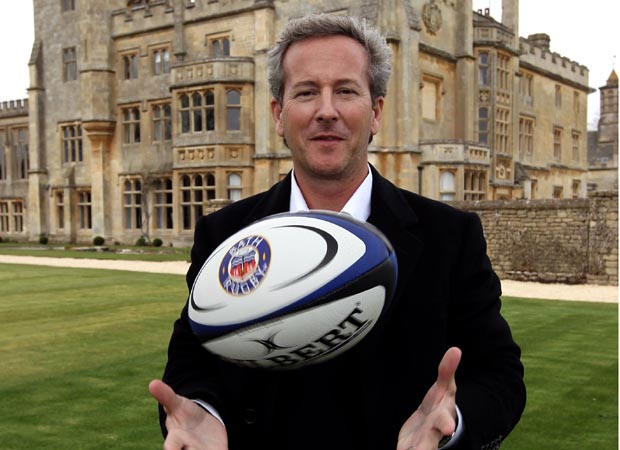 There are imperfections in most rugby structures, but, when it comes to getting the right outcome for the national team, England’s stick out like a carbuncle. Everywhere you look there are players who are contenders for the Red Rose shirt – or those who should be contenders – either playing out of position for their Premiership clubs, or stuck on the bench getting very little game time.
There are imperfections in most rugby structures, but, when it comes to getting the right outcome for the national team, England’s stick out like a carbuncle. Everywhere you look there are players who are contenders for the Red Rose shirt – or those who should be contenders – either playing out of position for their Premiership clubs, or stuck on the bench getting very little game time.
The Leicester boy-wonder, George Ford, is probably the most glaring case in point. We were told over the summer that the England coach Stuart Lancaster and the Leicester director of rugby, Richard Cockerill, had agreed that the best course of action for Ford’s development was for the 19-year-old to stand down from the England tour of South Africa, and/or the England U20s bid to win the Junior World Championships, in favour of an intensive weights programme.
This was designed to make the talented but lightweight 5ft 9in fly-half more powerful and dynamic, and, I understand that it has worked to the extent that Ford, who already possessed rapid acceleration over the first 10-15 metres, has not only filled out but is faster in speed tests than ever before.
Yet, for the first four games of the Premiership season, he has been stuck on the Tigers bench with Toby Flood starting every match at fly-half, so far getting just 22 minutes out of the 320 Premiership minutes on offer. This included Ford sitting out the draw against Saracens at Wembley and the home defeat by Harlequins last weekend in their entirety, despite Leicester failing to score a try in either match.
There have been signs over the past year that neither the experienced Flood nor Owen Farrell, who made his England debut at fly-half in last season’s Six Nations at the age of 20, have the complete game, and yet Lancaster seemed unperturbed by Ford’s lack of Premiership game time this season when he spoke to the media at the BMW Academy near Reading earlier this week.
The England coach’s view was: “He is still under 20 and we could still name him in the U20 squad. He is still a player in development but there will be games when Toby is away and he will be getting plenty of game time. He is a long-term project and is still developing. He will get a great deal of games in November, and it is up to him then to put his marker down about how he should stay there when the autumn internationals are finished. His opportunity is coming around the corner.”
To me it is a travesty that Ford, who will be 20 in March, is being held in reserve to the extent that he does not have a prayer of making the England squad for the autumn series, and it is surprising that Lancaster is so accepting of the situation.
Ford has already shown that he has the ability to run a game from fly-half with as much control and panache as either Flood or Farrell, not only helping Leicester to win the LV=Cup final last season, but also steering them to victory against Saracens in the Premiership semi-finals, before acquitting himself well in the final against Harlequins. Furthermore, he was picked ahead of Farrell at No.10 in the England U20 team that ran New Zealand close in the 2011 Junior World Championship final, with the Saracens tyro moving to inside centre.
What is crucial is that Ford gets as much Premiership game time as possible to develop his precocious skills. Instead of kicking his heels behind Flood at the Tigers, this is when he should be learning his trade by playing against him, and other leading No.10s in England and Europe, in full throttle league or cup matches every weekend. Why should Ford’s development be put on hold any more than that of Farrell or Manu Tuilagi, both of whom were capped by England at the age of 20, or, for that matter Jonny Wilkinson, who won his first England cap at the age of 18? Like them, if Ford is good enough, he is old enough – and England are in need of a fly-half who can challenge Flood and Farrell to raise their games.
One solution is that the RFU should advise any of the young players they hope to fast-track to take only one year rolling contracts with Premiership clubs early in their careers. That way, if they get blocked they can move to a club where they will be in the starting line-up on a consistent basis.
Some players make their own move, with the Harlequins hooker, Joe Gray, a prime example. Gray was stuck behind Dylan Hartley at Northampton, but rather than hang around he joined another club and a year later he is challenging the Saints captain for his England place. The same is true of Billy Twelvetrees, who moved to Gloucester from Leicester over the summer because he saw his route to England contention at inside-centre jammed by Anthony Allen. Like all England coaches, Lancaster is in a difficult club v country bind when it comes to getting players where he wants them. Where he would like Alex Goode as a goal-kicker, Saracens see Farrell and Charlie Hodgson as their regulars. While he is considering Tuilagi at inside centre, Leicester have insisted he is an outside centre. England see Courtney Lawes as a lock, but Northampton decide to switch him to blindside flanker.
Chris Robshaw has made headway at openside, but outside him none of the young No.7s in the Premiership, including Andy Saull, Matt Kvesic, and Luke Wallace get anywhere near enough game time.
Part of Lancaster’s role is to advance the cause of players like Ford if he considers them intrinsic to his plans.
It is not an easy brief given that Premiership clubs hold the primary contracts with players, but it is an essential one if England are to advance during his tenure – and if it means crossing swords with a few Premiership coaches, so be it.

6 Comments
You must be logged in to post a comment Login
Leave a Reply
Cancel reply
Leave a Reply
You must be logged in to post a comment.

Latest News
Magnifique! Another Grand Slam for Red Roses

Latest News
Luke Northmore still in the England reckoning























Thomas Lambert
12 October 2012 at 12:47 PM
What a stupid and pointless post. Suggesting players put their long term club futures at risk for honours that with probably never materialise. These clubs invested time and money in these young players for years and now people are telling them to slam the door in their faces like petulant children? Ford should do his time at leicester. Learn his trade behind flood and then when Cockers see’s fit, start more games. England is important, but so are clubs in the wellbeing of players and their careers. Writers should remember that.
Ross Tucknott (@RossiT)
24 October 2012 at 1:36 PM
You said it yourself: some players make their own move. If someone wants to get paid to twiddle their thumbs and not advance their game experience that’s their call, and is a loss both to England (not that it bothers me – National League club rugby’s far better!) and the club that he could be playing for instead.
This is no different to the Academy structure either though. Hundreds of talented youngsters are taken away from meaningful competitive club rugby so that they can play in A League games – whatever the outcome of the argument whether the A League or Championship is of better standard, neither are as good as a Championship where the best young talent is included and feels that they have something more at stake than just whether they can pick up a Prem contract and sit on a bench for a few more years afterwards… if they’re lucky. If not, the disillusionment that ex-Academy players feel as they slip down the leagues to the level they probably should have been playing at anyway encourages many to give up on rugby altogether.
Browner
6 November 2012 at 2:01 PM
Moving Clubs to advance your National Claims isn’t new…. Just ask Stuart Barnes [Bristol to bath ! ]
It’s folly to single out players from different scenario’s ….. England will need x3 players in every position to survive the ‘intensity’ of modern professional rugby
New Zealand have that depth which is why they are still benchmark side, if Carter is out another quality 10 comes in ………
Maybe this is why so many NZ Openside flankers have switched Nationality over the last 10 seasons ???? Imagine being No” Openside in NZ …..that bugger McCaw has been indestructable !!!
Pingback: micro step
Pingback: blote tieten
Pingback: รับทำเว็บ WordPress